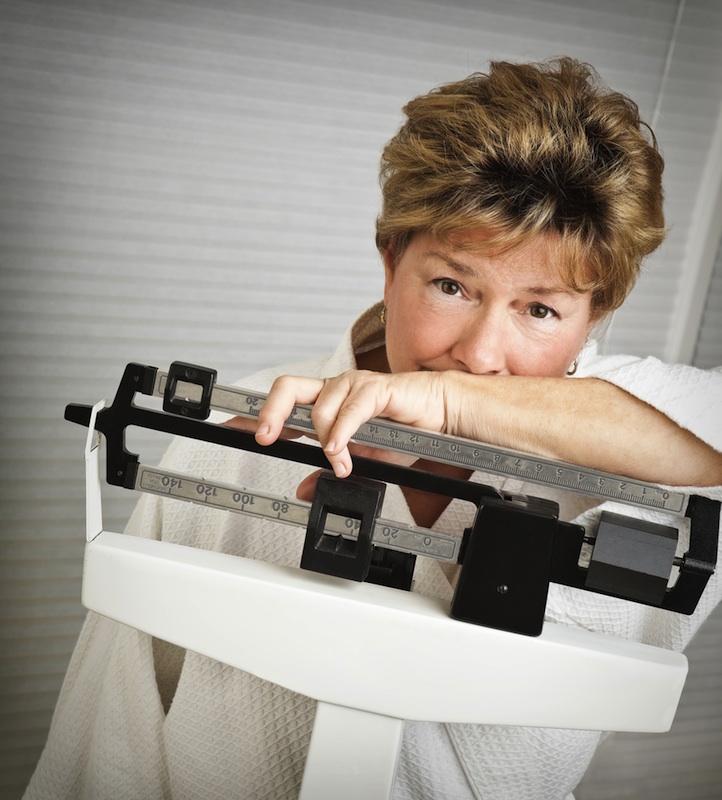Weight Worries Plague Women Over 50

Get the world’s most fascinating discoveries delivered straight to your inbox.
You are now subscribed
Your newsletter sign-up was successful
Want to add more newsletters?

Delivered Daily
Daily Newsletter
Sign up for the latest discoveries, groundbreaking research and fascinating breakthroughs that impact you and the wider world direct to your inbox.

Once a week
Life's Little Mysteries
Feed your curiosity with an exclusive mystery every week, solved with science and delivered direct to your inbox before it's seen anywhere else.

Once a week
How It Works
Sign up to our free science & technology newsletter for your weekly fix of fascinating articles, quick quizzes, amazing images, and more

Delivered daily
Space.com Newsletter
Breaking space news, the latest updates on rocket launches, skywatching events and more!

Once a month
Watch This Space
Sign up to our monthly entertainment newsletter to keep up with all our coverage of the latest sci-fi and space movies, tv shows, games and books.

Once a week
Night Sky This Week
Discover this week's must-see night sky events, moon phases, and stunning astrophotos. Sign up for our skywatching newsletter and explore the universe with us!
Join the club
Get full access to premium articles, exclusive features and a growing list of member rewards.
Age brings no relief from the desire to look svelte, according to new research that surveyed women over 50 and found that 71.2 percent were currently trying to lose weight.
The findings further revealed that many women go about this task in unhealthy ways. Almost 8 percent had purged (defined by vomiting, taking laxatives or otherwise trying to expel many calories from the body) at least once in the past year. About 7 percent reported over-exercising in an attempt to lose weight in the past five years, and 7.5 percent said they'd tried diet pills.
"This confirms what we have been seeing in the clinic (higher numbers of women in their 40s and beyond seeking treatment) and just hearing on the street — in locker rooms, board rooms, anywhere that women gather," study researcher Cynthia Bulik, the director of the University of North Carolina Eat Disorders Program, wrote in an email to LiveScience.
Weight and age
Though 53 million American women are over the age of 50, few studies have delved into this group's weight concerns, Bulik said. Some large studies have suggested that eating disorders are less common among older women than younger; but these studies usually lump all women over 45 into one group, a method that could obscure details about how middle-age and older women think about their bodies.
Clinicians, however, do see middle-age and older women coming in for treatment for eating disorders, and one 2001 study published in the International Journal of Eating Disorders found increasing hospital admissions over a period of 15 years for women older than 35. [5 Myths About Women's Bodies]
To find out more, Bulik and her colleagues conducted an online survey of 1,849 women over the age of 50. Most were between 50 and 84, though five respondents were 85 or older. These volunteers came to the survey through listservs, LinkedIn, Craigslist, senior centers and other organizations serving older women.
Get the world’s most fascinating discoveries delivered straight to your inbox.
The survey asked questions about age and race as well as height and weight, which the researchers used to calculate body-mass index, or BMI. BMI is a broad measure used to categorize people as underweight, normal weight, overweight or obese.
The women also reported whether they had experienced eating disorder symptoms such as binge-eating or purging in the last five years as well as currently. They were also asked about other weight woes, including how much they worried about their size or body shape, whether they were dieting, and what methods they had tried to lose weight. [7 Biggest Diet Myths]
Body image woes
Body image issues were rampant in the respondents, with 63.9 percent reporting that they thought about their weight on a daily basis. Almost 80 percent (79.1) said that their weight and body shape played a "moderate" to "most important" role in their self-image, while 61.8 percent said their size or shape negatively affected their lives at least occasionally. Thirty-six percent reported spending at least half of the previous five years on a diet.
Two-thirds of women were less satisfied with their appearance than they were when they were younger. The stomach was the most-hated body part, with 83.9 percent saying they were less happy with how it looked compared to their youth. Overall shape dissatisfaction followed at 73.3 percent. Seventy percent of women were less happy with their skin than they remembered being in their youth.
Just over 13 percent of the women reported current symptoms of an eating disorder, with 3.5 percent saying they binged at least once a week. More than a quarter, 27.7 percent, reported eating disorder behaviors in the past. In the past five years, 1.2 percent had vomited in an effort to purge, 2.2 percent had used laxatives, 2.5 percent had used diuretics (which flush water from the body) and 7.5 percent had used diet pills. Another 6.8 percent reported exercising to excess as a way of purging.
According to the Centers for Disease Control and Prevention (CDC) standards, 1.6 percent of the women surveyed would be considered underweight, 42.2 percent normal weight, 29.3 percent overweight and 26.9 percent obese. The women who reported currently trying to lose weight, dieting half the time and using diuretics and diet pills were more likely to have high BMIs. Those findings are important, Bulik and her colleagues wrote in the International Journal of Eating Disorders, because diet pills and other desperate attempts to lose weight are not only ineffective, they can be harmful.
The sample was 92 percent white, and the numbers may not generalize to the American population as a whole. But they illustrate that eating disorders and body dissatisfaction are not problems confined to youth, Bulik said.
"I think the big industries are targeting this population more," she said. "They create a culture of discontent by telling women that they should not look like they are aging; that they should do whatever they can afford to try to turn back the effects of time on their bodies. This pressure can lead them to extreme and unhealthy weight loss behaviors that can pave the way to eating disorders. There seems to be no rest for women at any age."
Patients in middle age may need different treatment approaches than patients in youth, Bulik said. Teens and young women often benefit from parental involvement with treatment, because family support is helpful for eating disorders. For older women, involving a partner or spouse may be beneficial, Bulik said.
Follow Stephanie Pappas on Twitter @sipappas or Live Science @livescience. We're also on Facebook & Google+.

Stephanie Pappas is a contributing writer for Live Science, covering topics ranging from geoscience to archaeology to the human brain and behavior. She was previously a senior writer for Live Science but is now a freelancer based in Denver, Colorado, and regularly contributes to Scientific American and The Monitor, the monthly magazine of the American Psychological Association. Stephanie received a bachelor's degree in psychology from the University of South Carolina and a graduate certificate in science communication from the University of California, Santa Cruz.
 Live Science Plus
Live Science Plus










